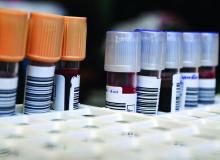Follow-up blood cultures rarely provide useful clinical information in patients who are being treated for Gram-negative bacteremia, according to a study by Gabriel M. Aisenberg, MD, and his colleagues.
In a review of 140 Gram-negative bacteremia episodes, 17 follow-up blood cultures (FUBC) were required to identify one positive result, wrote Dr. Aisenberg of McGovern Medical School at the University of Texas Health Science Center in Houston. This was in stark contest to the test’s utility in patients with Gram-positive infections, which identified one positive result for every five cultures. (Clin Infect Dis. 2017 July 26. doi: 10.1093/cid/cix648)
“FUBC may not be indicated in the setting of Gram-negative bacteremia,” Dr. Aisenberg and his coauthors wrote. “We caution physicians against drawing FUBC in Gram-negative bacteremia, as doing so might potentially lead to false positive results, longer hospital stays, and higher health care costs.”Dr. Aisenberg and his colleagues reviewed 500 bacteremias treated at a single center during 2015. The mean duration of bacteremia was about 3 days, with a mean follow-up time of 4.5 days. Most of the cases (206) were caused by Gram-positive cocci; 140 were due to Gram-negative bacilli, and 30 were polymicrobial.
Most patients (383; 77%) had at least one FUBC. Patients had an average of 2.3 FUBC, but the range was wide: Up to 12 cultures were performed for Gram-positive infections and up to six for Gram-negative infections.
Only 14% of the FUBC were positive, and most of these (78%) were for Gram-positive infections. Only eight cultures (15%) returned positive results for Gram-negative infections.
The mean duration of bacteremia was 3 days, and did not vary between Gram-positive, Gram-negative, or polymicrobial infections. The use of antibiotics wasn’t associated with a positive FUBC, although fever on the day of the test was. Urinary tract and severe skin infections were negatively associated with a positive FUBC, while IV catheter infections increased the risk. There were no associations between positive FUBC and mortality or ICU placement.
There are no guidelines describing the best use of FUBC in Gram-negative bacteremia, which are usually managed clinically, Dr. Aisenberg said.
“Even in Gram-negative bacteremia infections most prone to seeding the bloodstream, the bacteremia usually resolves within a short time after the institution of appropriate antibiotic therapy and/or source control,” he wrote. “Currently the management of [such infections] is determined by clinical judgment, allowing some clinicians to utilize blood cultures in an unrestricted way. Unrestrained use of blood cultures has serious implications for patient safety and health care costs,” driven by the strong likelihood of false positive results, which grows even stronger with repeat tests.
“As many as 90% of all blood cultures grow no organisms,” Dr. Aisenberg said. “Of the 10% that do, almost half are considered contaminants. Assuming a constant rate of contamination, the more FUBC performed, the higher the chance of encountering contamination, which may result in increased costs, longer hospital stays, unnecessary consultations, and inappropriate use of antibiotics.”
Neither Dr. Aisenberg nor his colleagues had any financial disclosures.


